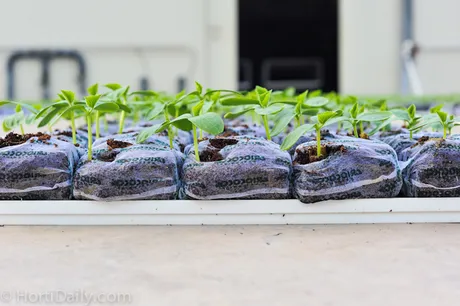
Coir propagation blocks aren't completely new, they have been around for some years now. But as many growers and plant propagators still rely on stone wool, it can still be seen as a niche that has not been fully adapted by the entire industry.
The reason for this lies in the past; many suppliers of coir entered the market with a wide selection of propagation blocks, all with different sizes, properties and compounds; a thorn in the side of young plant propagators as the product they were used to working with [stone wool] was much more stable and of a constant quality. As well as this, many of the automated processes in the nursery were already designed for stone wool; so young plant growers didn't feel much for coir propagation blocks.
But when you walk around on a trade show like IPM Essen or the Fruit Logistica, you will still see a lot of coir propagation blocks. According to Shan Halamba of Riococo, the demand for Riococo coir blocks are larger than ever.
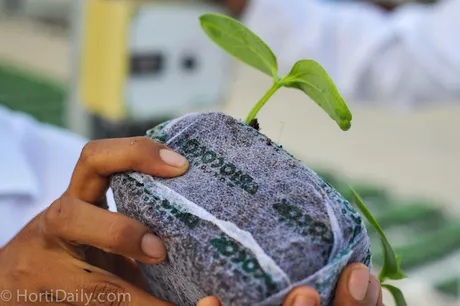
Logical next step
"Coir slabs have become very popular and are well accepted by the professional greenhouse growers throughout the world. The growers are fully aware of the advantages of coir growing media and now they are asking for a 100 percent coir based combination. A coir propagation block is a logical next step"As more and more growers are now taking care of their own young plant propagation, Riococo decided to focus on the development of a 'perfect' propagation cube. "The biggest advantage of coir is that, with the right balance of ingredients, you can make a product that makes it very easy to grow," said Shan. "We already have this right balance in our slabs, but now we have also developed a perfect mix for our propagation blocks as well."
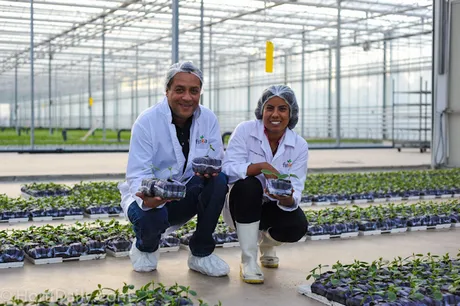
Edgar Leyton of Leyton Greenhouse Supply (distributor and consultant for Riococo in Mexico), together with Ing. Leonor Ortega of Finka's propagation greenhouse.
Minimal input
"With minimal input from the grower, crops like bell pepper, cucumber and tomato will start rooting within a few days after seeding," said Shan. "The right mix packed together with a biodegradable material that still is very strong and easy to handle."Over the last year, Riococo conducted several trials with growers all over the world, and shortly after this, large operations started working with the Riococo starter blocks.
"Growers in Japan and the Bahamas switched completely to our coir cubes", Shan said. "Right now we are also conducting trials with Mexican, USA and Canadian growers.
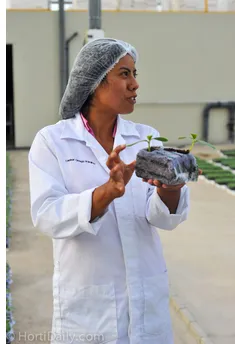 Trials at Finka
Trials at Finka
One of the growers in Mexico that is experimenting with the Riococo cubes is Finka, a well known high tech greenhouse with several facilities at the AgroPark in Queretaro.Ing. Leonor Ortega is in charge of the young plant propagation at Finka. The greenhouse vegetable grower propagates it's own young plants in a high tech nursery facility.
Ortega was asked by Riococo to run trials to compare the coco blocks with the conventional stone wool propagation. "The people at Finka have a lot of knowledge on vegetable propagation," said Shan. "Commercial trials with qualified growers like Finka is an important part of our plan to continue to develop a product line with products that growers want."
According to Finka's Ortega, the rooting in the coco cubes was remarkably faster. "We see more and bigger roots in the first three weeks after sowing. On the other hand, the stone cubes require less water and fertilizer. The coir cubes demand a different irrigation strategy. In our nursery we work with an ebb and flood irrigation system which perfectly works with a stone wool cube. We think that it will be possible to use coir cubes in combination with an ebb and floor system as well, but you will need to develop a perfect watering strategy."
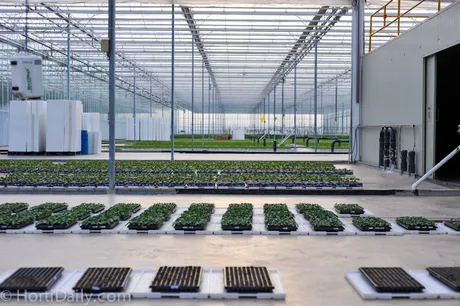
Critical feedback
"We are not afraid of critical feedback, because eventually we want to improve the blocks, otherwise it wouldn't make sense to run trials," said Riococo's Shan Halamba."Thanks to partners like Finka, we have the ability to test our products in true grower settings. These trial opportunities are extremely valuable in our quest to develop products that work with the tools, strategies and technologies that already exist in the commercial greenhouse market today."

To learn more about Riococo coir substrate, please visit www.riococo.com or send an e-mail to inquiries@riococo.com
